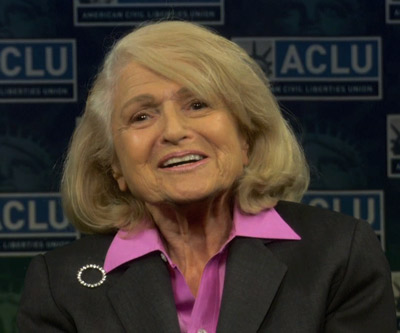Attorneys representing plaintiff Edie Windsor filed into the Supreme Court this morning to argue for the repeal of the Defense of Marriage Act (DOMA)—the 1996 law that prohibits recognition of same-sex marriages for federal purposes. Windsor, 83, married her longtime partner Thea Spyer in 2007 after a four-decade engagement. When Spyer passed away in 2009, Windsor inherited Spyer’s estate but was socked with a $363,000 tax bill. She wouldn’t have had to pay anything if she had been married to a man.
Windsor v. U.S. argued that DOMA is unconstitutional because it treats legally married same-sex couples differently than legally married heterosexual couples, a violation of the equal protection clause of the 14th Amendment. The case differs from Hollingsworth v. Perry, the marriage equality lawsuit argued the previous day, in that Windsor asks that the federal government give equal benefits to all legally married couples in the U.S. Hollingsworth v. Perry argues for the repeal of Proposition 8, California’s law that took away the right of same-sex couples to marry in that state, and so would only affect California couples.
According to court watchers, the justices asked numerous questions of both sides, and seemed to favor the repeal of DOMA. Five justices—Ginsburg, Breyer, Kagan, Sotomayor and Kennedy—appeared skeptical of DOMA’s legitimacy. Under DOMA, “there are two kinds of marriage,” Ginsburg said. “Full marriage and the skim-milk marriage.”
Reverend Rob Schenck, a representative of the pro-DOMA Evangelical Church Alliance who witnessed the proceedings, came away crestfallen. “DOMA is very shaken. While we stand for the defense of marriage as between one man and one woman, it is quite clear that that definition is at great risk.” Based on the Justices’ queries, especially those of Kennedy, “four Justices are convinced that DOMA has standing, has legitimacy…Chief Justice Roberts is a real question mark on this one, and our side of the argument found that very encouraging.”
Paul Clement, the former U.S. solicitor general who is representing House Republicans as the primary defense counsel, declined to speak to reporters.
Windsor’s attorneys from Paul, Weiss, Rifkind, Wharton & Garrison LLP; the American Civil Liberties Union; the New York Civil Liberties Union and the Stanford Law School Supreme Court Litigation Clinic were encouraged by the Justices’ attitudes. “The evolution of gay people’s rights at the Supreme Court has been a long road,” said Pamela Karlan of Stanford Law School. “We are confident that today, and in the near future, equal justice under the law will be a reality for gay people as well as straight people in the United States.”
Tossing away her lengthy prepared speech, Edie Windsor charmed the crowd of reporters with her heartfelt and humble comments.
“I wanted to tell you what marriage meant to me,” she said. “We lived together for 40 years [before marrying]. I am, today, an out lesbian who just sued the United States of America and it’s kind of overwhelming for me.”
She also spoke about the path that led her to the steps to the Supreme Court. “People ask me, ‘why get married?’ I was 77 and Thea was 75. But the fact is, everybody treated it as different. Marriage is different. I asked gay long-term couples who got married, ‘was it different the next morning?’ Yes, it was always different.”
“For anyone who doesn’t understand it or doesn’t get why we want it, it’s magic. This is a spectacular event for me. I know that the spirit of my late spouse Thea Spyer would be happy and proud of us all.”
When asked how she felt the Court responded to her case, Windsor replied, “I think it went beautifully. The justices were gentle, they were direct, asked all the right questions. I didn’t feel any hostility or any sense of inferiority. I felt very respected. I think it’s gonna be good.”


What Do You Think?